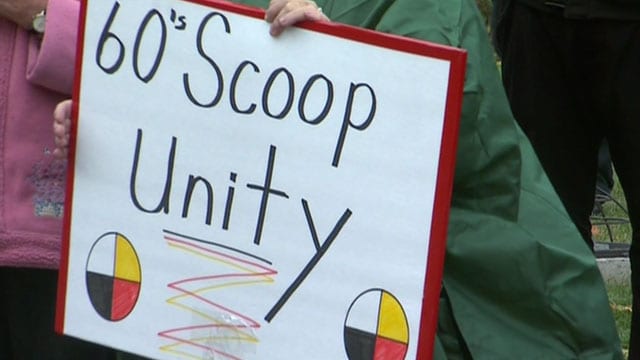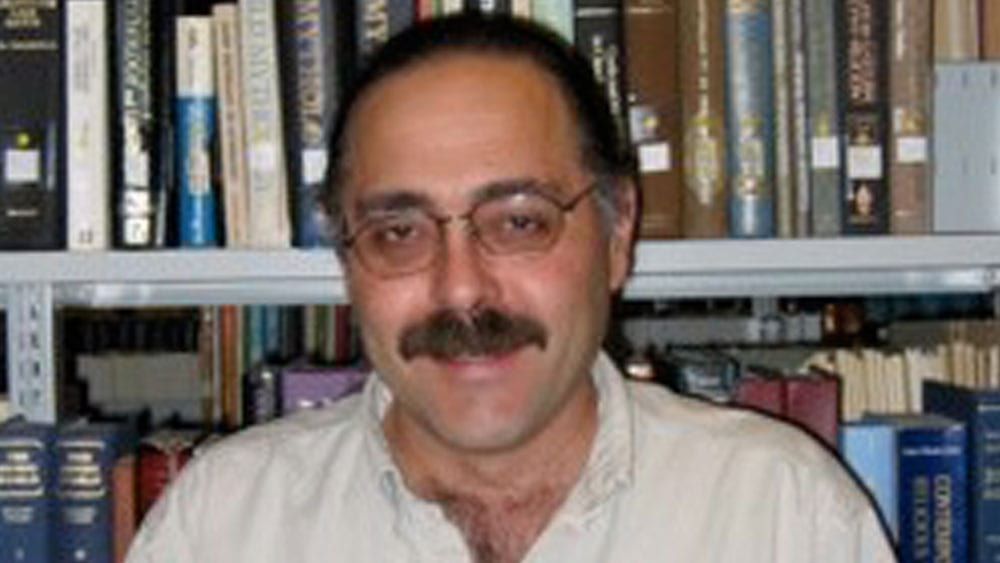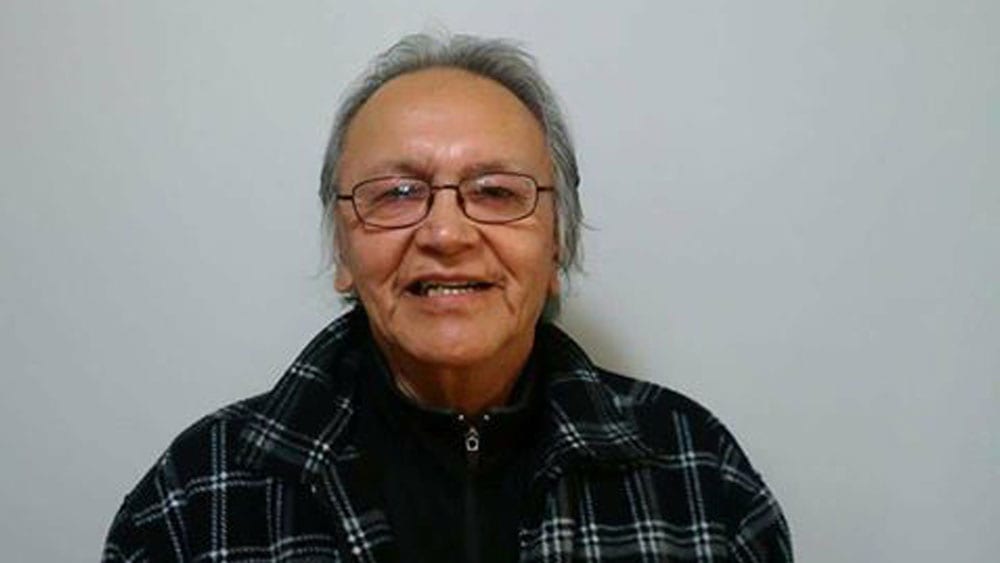
Editors Note: This is the first in a three-part series on 60s Scoop survivors and the lawyers pursuing them.
A lawyer facing a disciplinary hearing for his work with residential school survivors is actively signing up ‘60s Scoop adoptees, APTN News has learned.
Vancouver lawyer Stephen Bronstein, who was investigated and put under supervision, is being accused of unprofessional conduct by the Law Society of British Columbia.
Bronstein returned a call from APTN News but declined to comment.
The website of the Wei Wai Kum First Nation on Vancouver Island reports Bronstein twice visited the community last summer for an information session on the 60s Scoop settlement.
“The Wei Wai Kum First Nation does not endorse or advise members about these lawsuits,” the band said online. “We are providing information as a service to members.”
No one from the band returned calls seeking comment.
Bronstein worked under a supervisory lawyer appointed by the Supreme Court of B.C. after some residential school survivors complained about the way he handled their compensation claims.
Some of the survivors, who cannot be identified under court order, alleged Bronstein employed an ex-con to deliver paperwork and collect their signatures.
They further alleged the man, whose parole for murder was revoked after their accusations came to light, extorted them by demanding all or part of their compensation payouts.
“The lawyers are jumping in there already,” said Fred Thomas, a residential school survivor in northwestern Ontario.
Thomas helped dozens of residential school survivors complain to the Law Society of Upper Canada about the way their compensation claims were handled – only to see the case fall apart.
Now, with Ottawa pledging $750 million in financial compensation to ‘60s Scoop survivors, Thomas is expecting more unsavoury behaviour.
“I saw it happen to residential school survivors,” he said in a telephone interview.
The country’s law societies are supposed to regulate lawyer behaviour and crack down on abuse.
But Doug Racine said they failed to protect thousands of residential school survivors who were victimized during the out-of-court settlement known as the Independent Assessment Process (IAP).

In a nine-page letter shared with APTN, Racine blamed the law society for not doing enough about the “unethical practice or greed” of lawyers.
“Shopping for a lawyer should be like shopping for a car,” he said from Saskatoon. “You should talk to a few, ask them all kinds of questions, and call their references.”
Racine said the Law Society of Saskatchewan (LSS) claims to protect the public but failed to help Indigenous clients victimized under the IAP.
The LSS rejected Racine’s criticism, saying it had no power to intervene in an out-of-court settlement.
“The Law Society remains deeply committed to act in the public interest,” it said on its website.
“This core mandate applies equally to all citizens. To that end, the Law Society is responding to the Truth and Reconciliation Commission calls to action on both a provincial and federal level including call to action #27 requiring increased cultural competency for all lawyers.”
But Racine, an Aboriginal lawyer, waits to be proven wrong.
“For lawyers, it’s a race to the bottom now,” he said, noting he’s advising ‘60s Scoop survivors to wait for more information before hiring a lawyer.
“I’m telling people coming to me don’t sign anything. Let’s just wait and see what the feds come up with first.”
While the details are still being negotiated, Ottawa said in October it would settle instead of fight survivors in court.
The announcement came after an Ontario court judge sided with survivor and class-action plaintiff Marcia Brown Martel who spent 10 years suing the federal government.
The judge said Ottawa was liable for removing Indigenous children from their homes and adopting them into non-Indigenous families, a practice that stemmed from the 1960s.
“Great harm was done,” Superior Court Justice Edward Belobaba wrote in his decision. “…The ‘scooped’ children lost contact with their families. They lost their Aboriginal language, culture and identity.
“Neither the children nor their foster or adoptive parents were given information about the children’s Aboriginal heritage or about the various educational and other benefits that they were entitled to receive.
“The removed children vanished ‘with scarcely a trace.’”
The settlement means an ending for some but not for others because lawyers say the compensation applies only to status Indians and Inuit people – not Metis or non-status.
As well, there may be more lawsuits against provincial governments and their child welfare agencies for the abuse many survivors say was inflicted upon them.
Meaning more work and fees for lawyers.
APTN asked all of the law societies in Canada to provide a list of lawyers residential school survivors complained about.
It was told that information was confidential and names were only made public if disciplinary hearings were ordered.
APTN was told to keep checking the law society’s websites on a regular basis, thereby putting the onus on APTN to publicly report bad lawyers instead of law societies.
“I don’t understand their rules,” said Thomas.

He’s wondering if sounding the alarm now will be enough to protect ‘60s Scoop survivors when the compensation begins to flow in a year or two.
“I hope something reasonable comes out of the Mercredi report,” he said in interviews former national chief Ovide Mercredi is doing with residential school survivors on behalf of the Law Society of Upper Canada.
The Law Society of Manitoba said it is planning to reach out to ‘60s Scoop survivors the way it helped residential school survivors understand their legal rights.
That outreach paid off when some survivors told them they were being short-changed by former Winnipeg lawyer Howard Tennenhouse.
Tennenhouse, who was disbarred, accepted responsibility for taking close to a million dollars from 50 IAP claimants from northern Manitoba.
The law society says it paid them back and recouped the money from Tennenhouse, before turning its evidence over to Winnipeg police.
But APTN has learned Tennenhouse, who couldn’t be reached for comment for this story, won’t face criminal charges.
“I’m totally flabbergasted,” Sandy Bay First Nation Chief Lance Roulette said over the phone.
Former Calgary lawyer David Blott wasn’t charged either.
Blott was kicked out of the IAP for professional misconduct but allowed to resign from the Law Society of Alberta instead of being disbarred.
He earned a reported $21 million through the IAP.
The Law Society of Alberta has now hired an Indigenous Initiatives Liaison to work directly with survivors.
“I’ll be spending a good amount of time on the road,” joked lawyer Koren Lightning-Earle of Maskwacis First Nation.
“My job is to help them understand their rights, the way lawyers work and how they can complain.”
Lightning-Earle says she’ll get the word out through information sessions on First Nations. Then reach out to tribal offices, and Edmonton and Calgary inner-city organizations.
“I want to build a better relationship with communities and let them know what the law society is here for,” she said.
Meanwhile, a spokeswoman for the Law Society of British Colombia said Bronstein’s disciplinary hearing would be held early in 2018.










